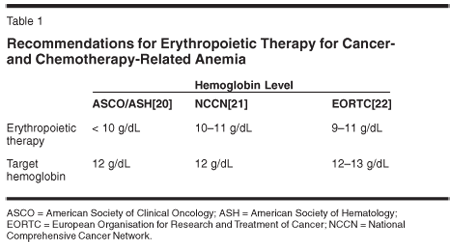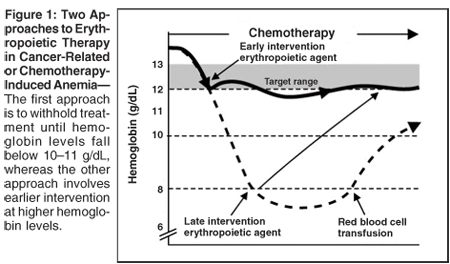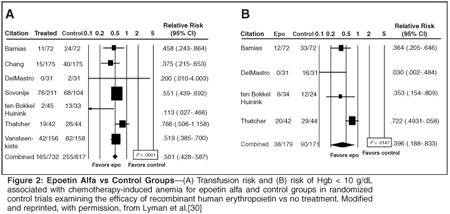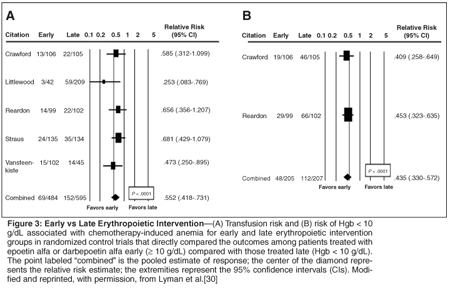Benefits of Early Intervention With Erythropoiesis-Stimulating Proteins in Chemotherapy-Induced Anemia
Anemia is common in patients treated with chemotherapy for both solid and hematologic malignancies, contributing to fatigue and diminished quality of life and exposing them to the inherent risks of red blood cell transfusions. Erythropoiesis-stimulating proteins have been shown to increase hemoglobin levels, reduce the need for transfusions, and improve quality of life. The current practice guidelines recommend treating moderate to severe chemotherapy-induced anemia with erythropoiesis-stimulating proteins, but the risk of transfusions may be less with earlier intervention at higher hemoglobin levels. A review of the literature suggests that treating mild chemotherapy-induced anemia with erythropoiesis-stimulating proteins reduces the risks of transfusions and the development of more-severe anemia. Weighing the clinical evidence together with other clinical and economic considerations should provide greater insight into the benefits of treating mild anemia in patients treated with chemotherapy.
Anemia is common in patients treated with chemotherapy for both solid and hematologic malignancies, contributing to fatigue and diminished quality of life and exposing them to the inherent risks of red blood cell transfusions. Erythropoiesis-stimulating proteins have been shown to increase hemoglobin levels, reduce the need for transfusions, and improve quality of life. The current practice guidelines recommend treating moderate to severe chemotherapy-induced anemia with erythropoiesis-stimulating proteins, but the risk of transfusions may be less with earlier intervention at higher hemoglobin levels. A review of the literature suggests that treating mild chemotherapy-induced anemia with erythropoiesis-stimulating proteins reduces the risks of transfusions and the development of more-severe anemia. Weighing the clinical evidence together with other clinical and economic considerations should provide greater insight into the benefits of treating mild anemia in patients treated with chemotherapy.
Anemia is common in patients treated with chemotherapy for solid and hematologic malignancies, with an incidence ranging between 30% and 90% depending on the type of cancer and the definition of anemia being used.[1] Anemia contributes to debilitating fatigue, cardiovascular problems, shortness of breath, reduced cognitive function, and lower quality of life (QOL).[2-4] Furthermore, chemotherapy-induced anemia is associated with substantial direct medical costs[5] as well as indirect costs related to disability and lost productivity.[6]
The introduction of recombinant human erythropoietin (rHuEPO; epoetin) into clinical practice in the 1990s revolutionized the management of chemotherapy-induced anemia. Epoetin alfa (Procrit) increases hemoglobin (Hgb) levels, reduces the need for red blood cell (RBC) transfusions, and improves QOL in patients with cancer and anemia treated with chemotherapy.[7-12] Darbepoetin alfa (Aranesp) is a novel erythropoiesis-stimulating protein (ESP) that has two more N-linked carbohydrate side chains and a greater sialic acid content than epoetin alfa, which increases its serum half-life and makes less frequent dosing without loss of efficacy possible.[13] Darbepoetin alfa has also shown efficacy in patients with chemotherapy-induced anemia, with improvements in hematologic measures and QOL.[6, 14-19]

The use of ESPs has become the standard of care in the management of anemia in patients with cancer. The clinical practice guidelines of the American Society of Clinical Oncology (ASCO) and the American Society of Hematology (ASH) recommend using ESPs routinely in patients with Hgb levels of 10 g/dL or less. The guidelines suggest that clinical circumstances should determine the use of ESPs in patients with less severe anemia (Hgb levels of 10-12 g/dL) (Table 1),[20] and a target Hgb level of 12 g/dL is suggested. Similarly, the clinical practice guidelines for cancer- and treatment-related anemia of the National Comprehensive Cancer Network (NCCN) recommend that ESPs be considered in symptomatic patients with Hgb levels of 11 g/dL or less, with a recommended target Hgb level of 11 to 12 g/dL.[21] The guidelines of the European Organisation for Research and Treatment of Cancer (EORTC) recommend ESPs in patients with Hgb levels of 9 to11 g/dL, according to their anemia-related symptoms.[22] The EORTC guidelines suggest that ESPs may also be considered in asymptomatic patients with Hgb levels of 9 to 11 g/dL to prevent a further decline in their Hgb levels. Target Hgb levels of 12 to 13 g/dL are recommended.
The guidelines were formulated on the basis of reductions in the risk of red blood cell transfusions of approximately 20% to 50% in patients treated with ESPs, as well as a favorable effect of ESPs on QOL.[10, 20-22] Determining the optimal Hgb level at which to initiate ESPs is difficult, however, because of the large variation between studies in pretreatment Hgb levels and a paucity of studies that have investigated outcomes in patients with different pretreatment levels.[22] The risk of red blood cell transfusions may be less with early intervention with ESPs at higher Hgb levels than with late intervention at lower levels (Figure 1). This is supported by statistical modeling of data in a recent subanalysis of findings from a large open-label study of darbepoetin alfa in patients with nonmyeloid malignancies treated with chemotherapy.[23] The clinical benefit of early intervention with ESPs in patients with chemotherapy-induced anemia has also been examined in a number of recent clinical trials.

Trials of Early Intervention With Erythropoietic Therapy
Early Interventionvs No Intervention
Several small studies have explored the benefits of early intervention with ESPs in cancer patients treated with chemotherapy. In patients with breast cancer, red blood cell transfusions were required in 2 (6%) of 31 patients in the control arm and in 0 of 31 patients in the ESP arm.[24] In another study, in ovarian cancer patients treated with platinum-based chemotherapy, the number of transfusions required within 6 months was less in patients treated with epoetin alfa than in those who did not receive ESP therapy (9% vs 39%).[25] Similarly, the Hgb levels fell to 10 g/dL or lower during six cycles of chemotherapy in fewer patients treated with epoetin alfa. In patients with small-cell lung cancer and pretreatment Hgb levels of 10.5 g/dL or higher, Hgb levels fell to 10 g/dL or less during treatment with chemotherapy in significantly more patients who were not treated with epoetin alfa (66%) than in those who were treated with epoetin alfa 150 IU/kg (48%; P < .05) or 300 IU/kg (39%; P = .005).[26] Transfusions were required in 59% of patients who were not treated with epoetin alfa, in 45% of those treated with epoetin alfa 150 IU/kg (P < .05), and in 20% of those treated with epoetin alfa 300 IU/kg (P < .001).[26]
In a larger study involving 354 breast cancer patients who were randomized to treatment with epoetinalfa to maintain their Hgb levels at12 g/dL or higher, transfusions were required in significantly fewer patients who were treated with epoetin alfa than in those who were not (9% vs 23%; P < .001).[27] Likewise, transfusions were required in significantly fewer patients with solid tumors treated with platinum-based chemotherapy who were given epoetin alfa than in those who were not (15% vs 33%; P = .02), with significant anemia developing in fewer of those treatedwith epoetin alfa (17% vs 46%; P < .001).[28] More recently, early intervention with epoetin alfa in patients with solid tumors treated with chemotherapy was associated with an increase in Hgb levels of 1.6 g/dL, compared with a reduction in Hgb levels of 0.04 g/dL in patients receiving best supportive care for anemia (P < .001).[29] Transfusions were also required in significantly fewer patients treated with epoetin alfa in this study (36% vs 65%; P < .001).[29] Similar results have been seen with darbepoetin alfa; transfusions were required in significantly fewer patients with lung cancer and pretreatment Hgb levels of 11 g/dL or lower who were treated with darbepoetin alfa than in those who were treated with placebo (27% vs 52%; P < .001).[14]
In a recent systematic review of randomized controlled trials of ESP therapy for chemotherapy-induced anemia, early intervention with an ESP was found to decrease the incidence of transfusions compared with no ESP treatment, with a relative risk reduction of 0.50 (95% confidence interval (CI) = 0.43-0.59; P < .0001) (Figure 2A).[30] An even greater risk reduction for hemoglobin falling below 10 g/dL was observed from early treatment with ESPs vs no treatment (relative risk reduction, 0.40; 95% CI, 0.19-0.83; P = .0147) (Figure 2B).

Early vs Late Intervention
Several subanalyses of studies have been conducted to evaluate the comparative efficacy of early vs late intervention for anemia. In a subanalysis of the study of darbepoetin alfa vs placebo in patients with lung cancer and pretreatment Hgb levels of 11 g/dL or lower mentioned previously,[14] a reduction in transfusion requirement was observed when darbepoetin alfa was administered to patients with pretreatment Hgb levels of 10 g/dL or greater, compared with darbepoetin alfa recipients with pretreatment Hgb less than 10 g/dL (15% vs 31%).[15] Both comparisons were statistically significant vs placebo; statistical within group comparisons in patients with different pretreatment Hgb levels were not performed.[15] Similarly, a subanalysis of a study evaluating epoetin alfa in patients with hematologic malignancies who had anemia[31] found early intervention (Hgb > 10.5 g/dL but ≤ 12.0 g/dL) reduced transfusion rates compared with later intervention (Hgb ≤ 10.5 g/dL) (7.1% vs 28.2%).[32]
The relative benefits of early vs late intervention with erythropoietic therapy in patients with chemotherapy-induced anemia have been directly compared in a number of randomized controlled trials. Patients with advanced non-small-cell lung cancer treated with first-line chemotherapy were randomized to early treatment with epoetin alfa (Hgb levels 11-15 g/dL) or to observationand late treatment (treatment initiated when the Hgb level fell to ≤ 10 g/dL).[33] Significant anemia developed in fewer patients in the early-treatment group than in patients in the late-treatment group (18% vs 44%; P < .001). Moreover, there was a trend toward transfusions being required in fewer patients in the early-treatment group (12% vs 21%).
In another randomized study, the benefits of early vs late intervention were assessed in patients with hematologic malignancies and Hgb levels of 10 g/dL or higher.[34] Patients with pretreatment Hgb levels of 10 to 12 g/dL were randomized to immediate treatment with epoetin alfa or to late treatment (after their Hgb level had fallen to < 9 g/dL). Transfusions were required in fewer patients in the early-treatment group than in the late-treatment group (18% vs 26%), but the difference was not significant. A mean increase in Hgb levels of 1.2g/dL was observed with early intervention, compared with a mean decrease in Hgb of 0.2 g/dL with late intervention (P < .001).
A systematic review of data from prospective studies and/or planned subset analyses from randomized controlled trials in which early and late intervention with ESPs for chemotherapy-induced anemia was compared showed a relative risk reduction for transfusions favoring early intervention of 0.55 (95% CI = 0.42-0.73; P < .0001) (Figure 3A).[30] A reduction in the risk of hemoglobin falling below 10 g/dL was also seen with early vs late ESP treatment (risk reduction, 0.44; 95% CI = 0.33-0.57; P < .0001) (Figure 3B).

Summary
The current guidelines recommend erythropoietic therapy in patients with cancer and moderate to severe anemia. These guidelines are based on a reduction in the risk of transfusions of 20% to 50% with treatment with ESPs. A review of the literature indicates that treating mild chemotherapy-induced anemia reduces the risk of transfusions and the development of more severe anemia, to a magnitude similar to that which was used as the basis for current treatment recommendations. These studies provide insights into the potential benefits of maintaining target Hgb levels in patients with chemotherapy-induced anemia. The potential benefits and safety of maintaining target Hgb levels, as opposed to correcting depressed levels, during treatment with chemotherapy should be considered in terms of the effects of treatment with ESPs on transfusion requirements, QOL, and perhaps the ability to deliver the scheduled chemotherapy on time. Weighing the clinical evidence together with other clinical and economic considerations should provide greater insight into the potential value of treating mild anemia in patients receiving chemotherapy.
Disclosures:
Dr. Lyman receives research support from Amgen, and he serves on speakers bureaus for Amgen and Ortho Biotech.
References:
1. Knight K, Wade S, Balducci L: Prevalence and outcomes of anemia in cancer: A systematic review of the literature. Am J Med 116(suppl 7A):11S-26S, 2004.
2. Curt GA, Breitbart W, Cella D, et al: Impact of cancer-related fatigue on the lives of patients: New findings from the Fatigue Coalition. Oncologist 5:353-360, 2000.
3. Glaspy J: Anemia and fatigue in cancer patients. Cancer 92(6 suppl):1719-1724, 2001.
4. Ludwig H, Strasser K: Symptomatology of anemia. Semin Oncol 28:7-14, 2001.
5. Lyman GH, Berndt ER, Kallich JD, et al: The economic burden of anemia in cancer patients receiving chemotherapy. Value Health 8:149-156, 2005.
6. Berndt E, Kallich J, McDermott A, et al: Reductions in anaemia and fatigue are associated with improvements in productivity in cancer patients receiving chemotherapy. Pharmacoeconomics 23:505-514, 2005.
7. Seidenfeld J, Piper M, Flamm C, et al: Epoetin treatment of anemia associated with cancer therapy: A systematic review and meta-analysis of controlled clinical trials. J Natl Cancer Inst 93:1204-1214, 2001.
8. Glaspy J, Bukowski R, Steinberg D, et al: Impact of therapy with epoetin alfa on clinical outcomes in patients with nonmyeloid malignancies during cancer chemotherapy in community oncology practice. Procrit Study Group. JClin Oncol 15:1218-1234, 1997.
9. Demetri GD, Kris M, Wade J, et al: Quality-of-life benefit in chemotherapy patients treated with epoetin alfa is independent of disease response or tumor type: Results from a prospective community oncology study. Procrit Study Group. J Clin Oncol 16:3412-3425, 1998.
10. Gabrilove JL, Cleeland CS, Livingston RB, et al: Clinical evaluation of once-weekly dosing of epoetin alfa in chemotherapy patients: Improvements in hemoglobin and quality of life are similar to three-times-weekly dosing. JClin Oncol 19:2875-2882, 2001.
11. Crawford J, Cella D, Cleeland CS, et al: Relationship between changes in hemoglobin level and quality of life during chemotherapy in anemic cancer patients receiving epoetin alfa therapy. Cancer 95:888-895, 2002.
12. Bohlius J, Langensiepen S, Schwarzer G, et al: Recombinant human erythropoietin and overall survival in cancer patients: Results of a comprehensive meta-analysis. J Natl Cancer Inst 97:489-498, 2005.
13. Egrie JC, Browne JK: Development and characterization of novel erythropoiesis stimulating protein (NESP). Br J Cancer 84(suppl 1):3-10, 2001.
14. Vansteenkiste J, Pirker R, Massuti B, et al: Double-blind, placebo-controlled, randomized phase III trial of darbepoetin alfa in lung cancer patients receiving chemotherapy. J Natl Cancer Inst 94:1211-1220, 2002.
15. Vansteenkiste J, Tomita D, Rossi G, et al: Darbepoetin alfa in lung cancer patients on chemotherapy: A retrospective comparison of outcomes in patients with mild versus moderate-to-severe anaemia at baseline. SupportCare Cancer 12:253-262, 2004.
16. Kotasek D, Steger G, Faught W, et al: Darbepoetin alfa administered every 3 weeks alleviates anaemia in patients with solid tumours receiving chemotherapy: Results of a double-blind, placebo-controlled, randomised study. Eur J Cancer 39:2026-2034, 2003.
17. Vadhan-Raj S, Mirtsching B, Charu V, et al: Assessment of hematologic effects and fatigue in cancer patients with chemotherapy-induced anemia given darbepoetin alfa every two weeks. J Support Oncol 1:131-138, 2003.
18. Patton J, Reeves T, Wallace J: Effectiveness of darbepoetin alfa versus epoetin alfa in patients with chemotherapy-induced anemia treated in clinical practice. Oncologist 9:451-458, 2004.
19. Schwartzberg LS, Yee LK, Senecal FM, et al: A randomized comparison of every-2-week darbepoetin alfa and weekly epoetin alfa for the treatment of chemotherapy-induced anemia in patients with breast, lung, or gynecologic cancer. Oncologist 9:696-707, 2004.
20. Rizzo JD, Lichtin AE, Woolf SH, et al: Use of epoetin in patients with cancer: Evidence-based clinical practice guidelines of the American Society of Clinical Oncology and the American Society of Hematology. J Clin Oncol 20:4083-4107, 2002.
21. National Comprehensive Cancer Network: NCCN Clinical Practice Guidelines in Oncology: Cancer and treatment-related anemia. Version 1.2006. Available at http://www.nccn.org. Accessed March 9, 2006.
22. Bokemeyer C, Aapro MS, Courdi A, et al: EORTC guidelines for the use of erythropoietic proteins in anaemic patients with cancer. Eur J Cancer 40:2201-2216, 2004.
23. Vadhan-Raj S, Mirtsching B, Gregory SA, et al: Baseline (BL) covariates of response to darbepoetin alfa (DA) every 2 weeks (Q2W) in patients (pts) with chemotherapy-induced anemia (CIA) (abstract 8061). Proc Am Soc Clin Oncol 23:740, 2004.
24. Del Mastro L, Venturini M, Lionetto R, et al: Randomized phase III trial evaluating the role of erythropoietin in the prevention of chemotherapy-induced anemia. J Clin Oncol 15:2715-2721, 1997.
25. ten Bokkel Huinink WW, de Swart CA, van Toom DW, et al: Controlled multicentre study of the influence of subcutaneous recombinant human erythropoietin on anaemia and transfusion dependency in patients with ovarian carcinoma treated with platinum-based chemotherapy. Med Oncol 15:174-182, 1998.
26. Thatcher N, De Campos ES, Bell DR, et al: Epoetin alpha prevents anaemia and reduces transfusion requirements in patients undergoing primarily platinum-based chemotherapy for small cell lung cancer. Br J Cancer 80:396-402, 1999.
27. Chang J, Couture F, Young S, et al: Weekly epoetin alfa maintains hemoglobin, improves quality of life, and reduces transfusion in breast cancer patients receiving chemotherapy. J Clin Oncol 23:2597-2605, 2005.
28. Bamias A, Aravantinos G, Kalofonos C, et al: Prevention of anemia in patients with solid tumors receiving platinum-based chemotherapy by recombinant human erythropoietin: A prospective, open label, randomized trial by the Hellenic Cooperative Oncology Group. Oncology 64:102-110, 2003.
29. Savonije JH, van Groeningen CJ, van Bochove A, et al: Effects of early intervention with epoetin alfa on transfusion requirement, hemoglobin level and survival during platinum-based chemotherapy: Results of a multicenter randomised controlled trial. Eur J Cancer 41:1560-1569, 2005.
30. Lyman GH, Glaspy J: Are there clinical benefits with early erythropoietic intervention for chemotherapy-induced anemia? A systematic review. Cancer 106:223-233, 2006.
31. Littlewood TJ, Bajetta E, Nortier JW, et al: Effects of epoetin alfa on hematologic parameters and quality of life in cancer patients receiving nonplatinum chemotherapy: Results of a randomized, double-blind, placebo-controlled trial. J Clin Oncol 19:2865-2874, 2001.
32. Littlewood TJ, Bajetta E, Rapoport B, et al: Early administration of epoetin alfa optimizes anemia management with respect to hematologic and quality of life (QOL) outcomes in anemic cancer patients (pts) undergoing chemotherapy (abstract 3524). Blood 100:18b-19b, 2002.
33. Crawford J, Robert F, Perry M, et al: Epoetin alfa 40,000 U once weekly maintains hemoglobin in advanced non-small-cell lung cancer patients receiving first-line chemotherapy (abstract 2527). Proc Am Soc Clin Oncol 22:628, 2003.
34. Straus DJ, Testa M, Riggs SA, et al: Early treatment with epoetin alfa improves anemia, quality of life (QOL), and productivity in patients (pts) with hematologic malignancies and mild anemia during chemotherapy (CT) (abstract 1811). Blood 102:497a, 2003.